Iowa Golf Hall of Fame member Jim Hasley passes away
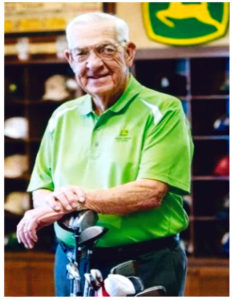 Iowa Golf Hall of Fame member James W. “Jim” Hasley, 87, of Davenport, died unexpectedly Monday, May 31, 2021. Hasley was inducted into the Iowa Golf Hall of Fame in 2010.
Iowa Golf Hall of Fame member James W. “Jim” Hasley, 87, of Davenport, died unexpectedly Monday, May 31, 2021. Hasley was inducted into the Iowa Golf Hall of Fame in 2010.
A Mass of Christian Burial for Jim will be 10:30 a.m. Friday, June 4, 2021 at St. Paul the Apostle Catholic Church, Davenport. The Mass will be livestreamed by visiting https://www.facebook.com/stpauldisciples/. Burial will be in Mt. Calvary Cemetery, Davenport. Visitation will be Thursday from 4 until 7 p.m. at the Halligan McCabe DeVries Funeral Home, Davenport with the rosary at 3:30 p.m. that all are welcome to pray. There will be additional visitation at church on Friday from 9:30 a.m. until the time of the Mass. In lieu of flowers, memorials may be made First Tee, Quad Cities.
James William Hasley was born on January 7, 1934 in What Cheer, Iowa, a son of William “Bill” and Elizabeth “Betty” (Simmons) Hasley. Jim was raised in Williamsburg, Iowa and moved to Davenport with his family in 1947 after his father passed away.
In 1950, Jim began attending Iowa State Teachers College in Cedar Falls, Iowa where he ran track, but left after his junior year to go to work at Westinghouse Supply Company in Davenport. Taking up golf with a group from Westinghouse Supply, Jim, being a natural athlete, turned out to have a pretty decent swing. He began giving pro bono group lessons at Emeis in 1965. In 1968 he became Bob Fry’s assistant golf professional running Duck Creek Golf Course. In 1971, Jim became the head golf professional for the city of Davenport courses, running Emeis, Duck Creek and Credit Island Golf Courses. He retired in 2001 from Emeis and took over operations at Red Hawk Golf Course and Learning Center when the city of Davenport bought the course. In the summer of 2001, he helped launch the First Tee – Quad Cities Chapter. Jim’s greatest joy in his golf career was helping to shape young people’s love for the game of golf.
Read more from Hasley’s full obituary by clicking here.
Read a feature on Hasley’s impact on the community by clicking here.
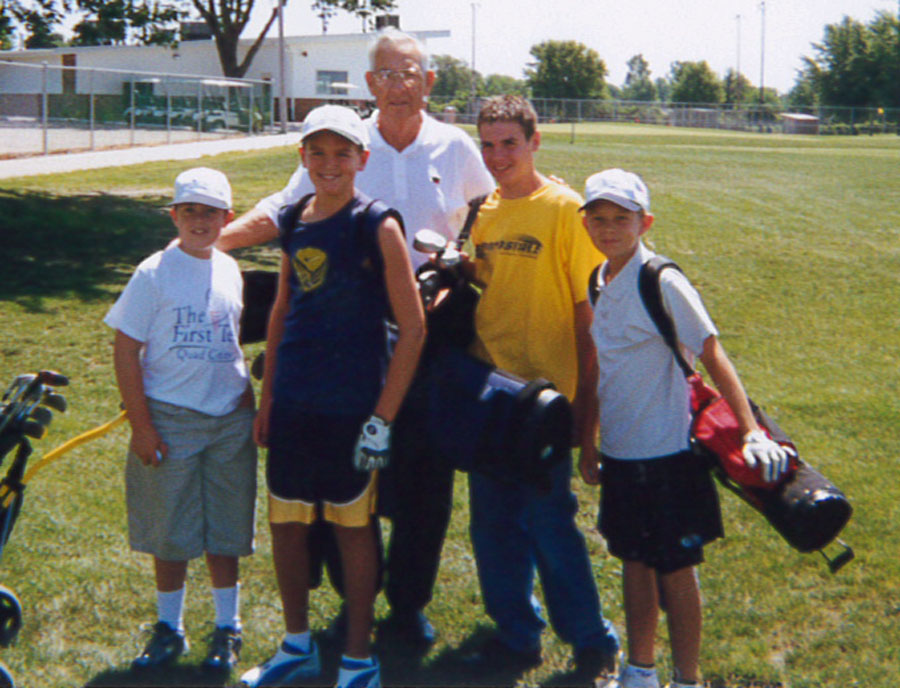
Above – Hasley served as the Head Professional at Emeis Golf Course in Davenport for more than 30 years and stepped down from that position at the end of 2001. He stayed involved by taking over the 9-hole Red Hawk Golf Course in Davenport and was a key figure in the development of The First Tee Chapter of the Quad Cities at that location. Hasley’s love of the game shined through when he is on the lesson tee with the kids of The First Tee program.


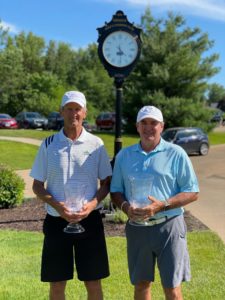 The final day of the
The final day of the 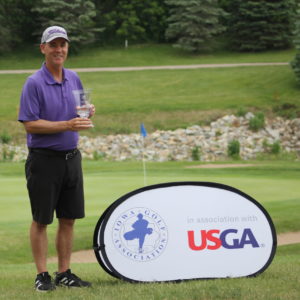 In the President’s Bracket, Chuck Malloy (right), of Cedar Falls, topped the runner-up, Craig Furnish. Malloy took an early lead but Furnish continued to fire back. Malloy was able to take control at the end, winning the match 3&2.
In the President’s Bracket, Chuck Malloy (right), of Cedar Falls, topped the runner-up, Craig Furnish. Malloy took an early lead but Furnish continued to fire back. Malloy was able to take control at the end, winning the match 3&2.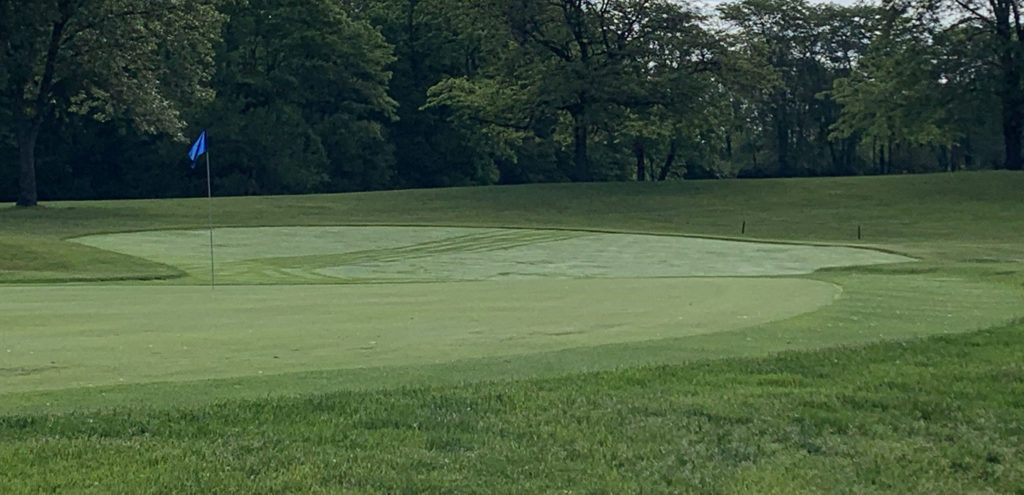
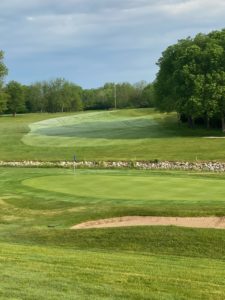 The IGA Senior Match Play began Monday morning at Geneva Golf & CC in Muscatine, with 18-holes of stroke play to determine the 32-player field for the Senior and the 23-player field in the Super Senior Divisions. There was a five-way tie in the Senior Division for medalist. The tie was settled by a cardback tie-breaker between Robert Dickerman, Jay Gregory, Terry Cook, Tom Norton and Scott Briggs.
The IGA Senior Match Play began Monday morning at Geneva Golf & CC in Muscatine, with 18-holes of stroke play to determine the 32-player field for the Senior and the 23-player field in the Super Senior Divisions. There was a five-way tie in the Senior Division for medalist. The tie was settled by a cardback tie-breaker between Robert Dickerman, Jay Gregory, Terry Cook, Tom Norton and Scott Briggs.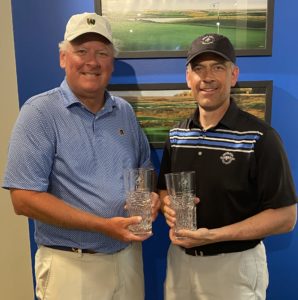
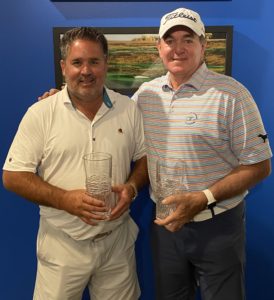 In the Senior Division, Joe Palmer and Terry Cook (left) collected their third title in the division and fourth overall, winning the Open Division crown in 2004. Similar to the Elliott/Brown side, Palmer and Cook were chasing the leaders entering the final round – two shots back off the pace.
In the Senior Division, Joe Palmer and Terry Cook (left) collected their third title in the division and fourth overall, winning the Open Division crown in 2004. Similar to the Elliott/Brown side, Palmer and Cook were chasing the leaders entering the final round – two shots back off the pace.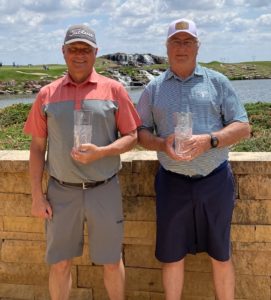 In the Super Senior Division, the side of Bill Mathers / Vernon VanPerseum (right) battled back with a final round 67 (-5) to win the title by a stroke over first round leaders Rick Gorbell and Wes Hogeland. Mathers/VanPerseum posted rounds of 73-67 (-5).
In the Super Senior Division, the side of Bill Mathers / Vernon VanPerseum (right) battled back with a final round 67 (-5) to win the title by a stroke over first round leaders Rick Gorbell and Wes Hogeland. Mathers/VanPerseum posted rounds of 73-67 (-5).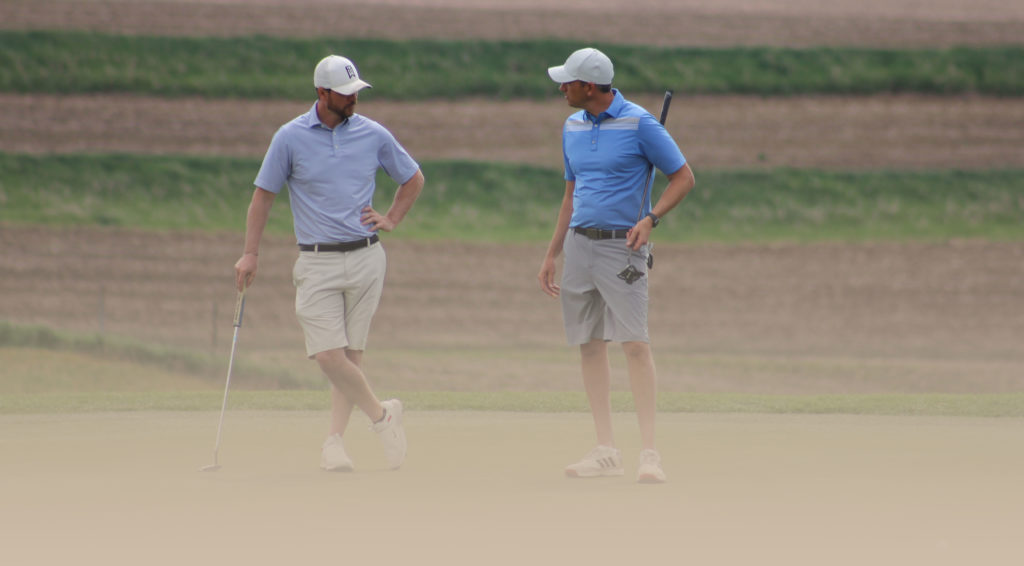
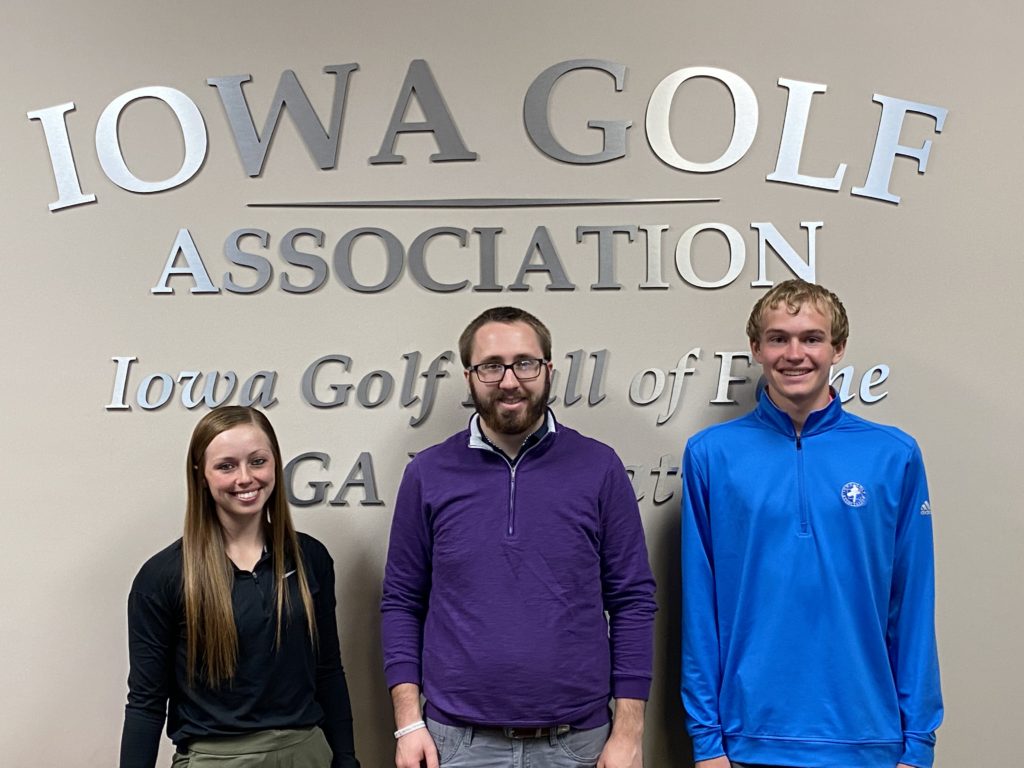
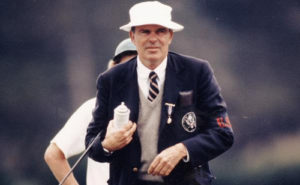 The program honors the contributions of P.J. Boatwright Jr. (pictured), the USGA’s third executive director, who played a pivotal role in the development of both the USGA and golf in the United States. An accomplished amateur player and one of the game’s foremost Rules experts, he served as executive director of the Carolinas Golf Association for five years before joining the USGA in 1959. He served the association until his death in 1991, leaving a legacy of sportsmanship and service.
The program honors the contributions of P.J. Boatwright Jr. (pictured), the USGA’s third executive director, who played a pivotal role in the development of both the USGA and golf in the United States. An accomplished amateur player and one of the game’s foremost Rules experts, he served as executive director of the Carolinas Golf Association for five years before joining the USGA in 1959. He served the association until his death in 1991, leaving a legacy of sportsmanship and service.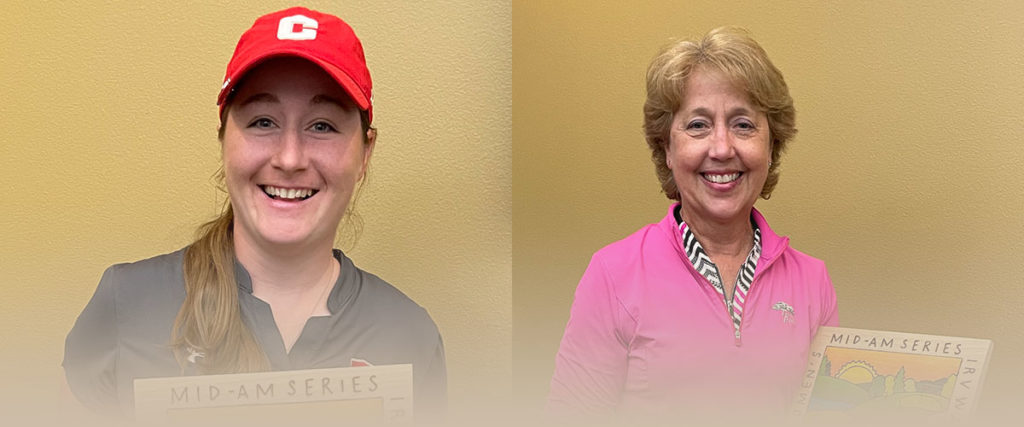

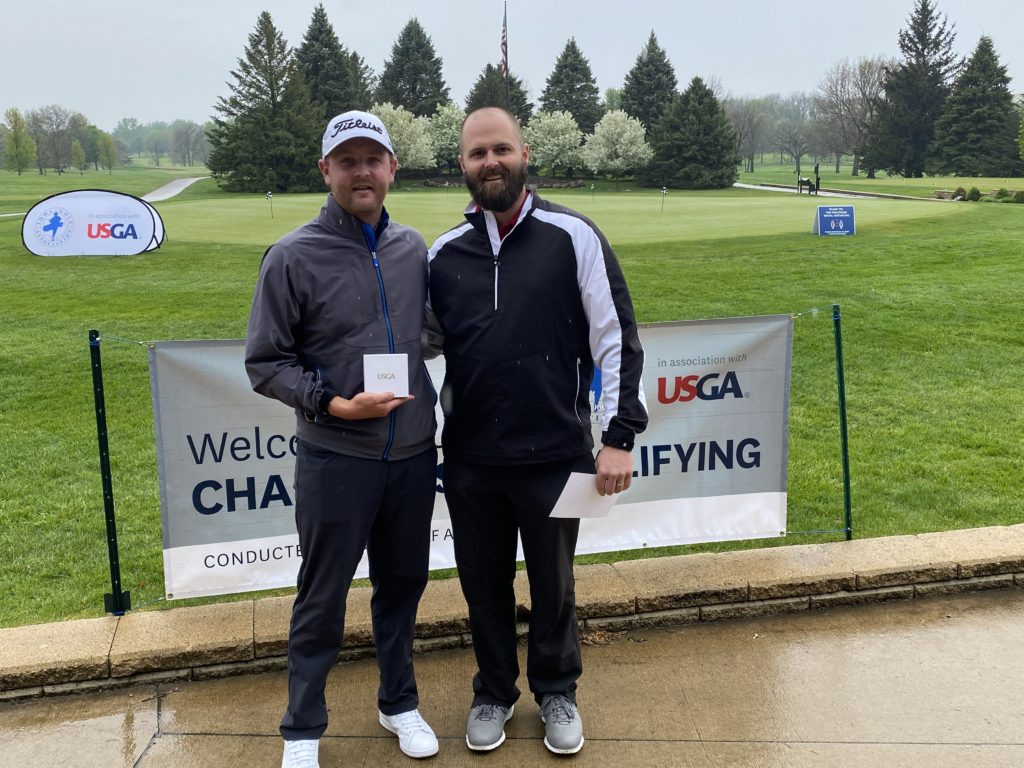
 Des Moines’ Tripp Kinney, who was -9 at one point in his round, shared medalist honors with Andrew Petersen, of Bondurant, (both pictured above – Kinney left, Petersen right) as both posted rounds of 66 (-6) to secure two of the four qualifying spots available. Sam Meuret (right), of West Des Moines, shot 67 (-5) to elude a playoff of five players, who shot 69 (-3) chasing the final spot.
Des Moines’ Tripp Kinney, who was -9 at one point in his round, shared medalist honors with Andrew Petersen, of Bondurant, (both pictured above – Kinney left, Petersen right) as both posted rounds of 66 (-6) to secure two of the four qualifying spots available. Sam Meuret (right), of West Des Moines, shot 67 (-5) to elude a playoff of five players, who shot 69 (-3) chasing the final spot.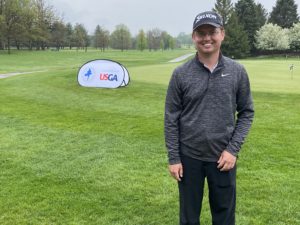 With a birdie on the first playoff hole, Ottumwa’s Matthew Walker (left) captured the lone remaining spot. All four are now one step closer to the U.S. Open and will compete at Final Qualifying locations across the country in a couple of weeks.
With a birdie on the first playoff hole, Ottumwa’s Matthew Walker (left) captured the lone remaining spot. All four are now one step closer to the U.S. Open and will compete at Final Qualifying locations across the country in a couple of weeks.